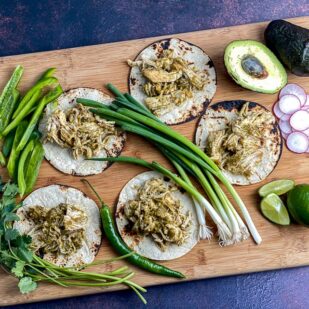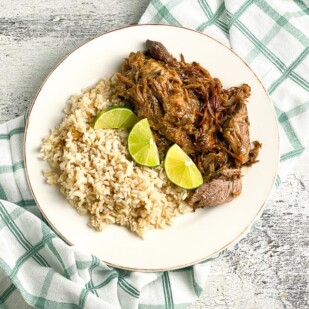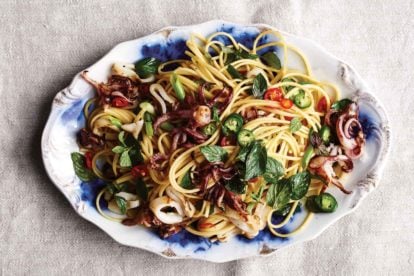We love one-pot dishes, we love braised dishes, and we love winter squash! This One-Pot Low FODMAP Braised Chicken with Swiss Chard and Acorn Squash brings it all together, with Asian flavors of soy, toasted sesame oil, and ginger. Monash University lab tested acorn squash, and we now know what a low FODMAP serving size is, so we had to create something tasty for you. There will be more acorn squash recipes to come!
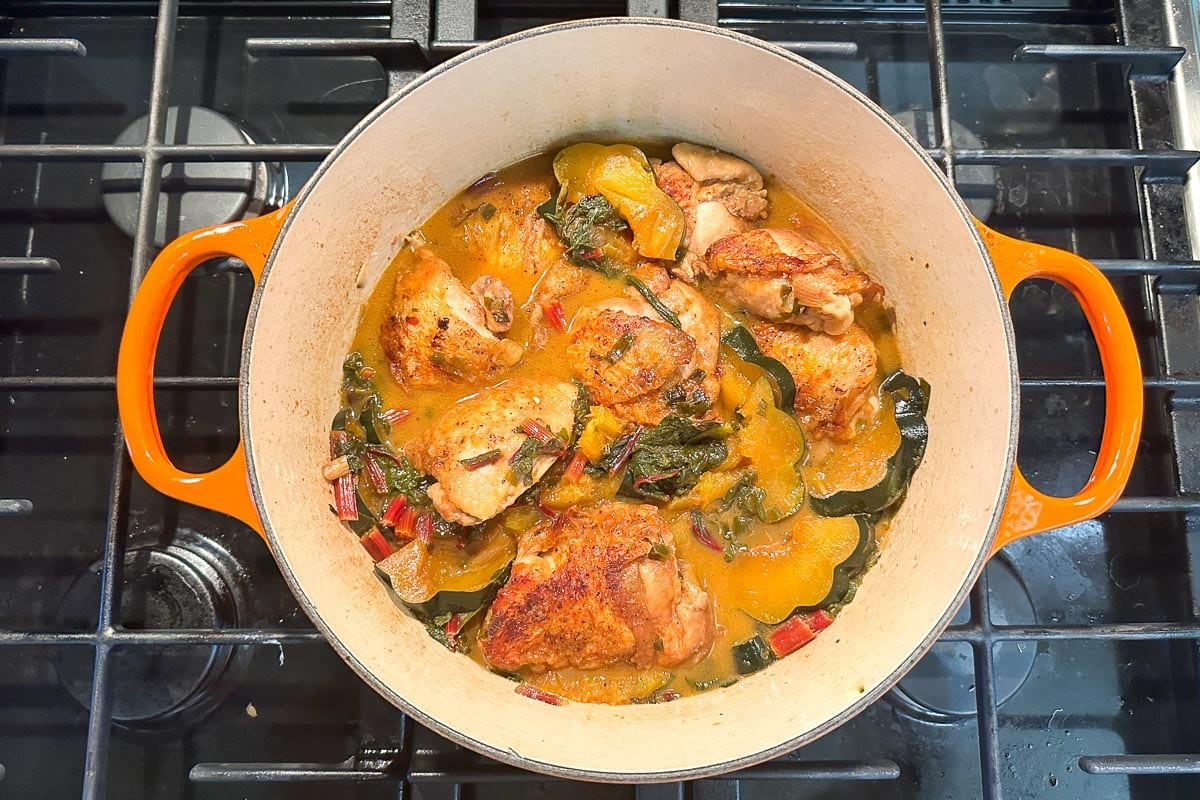
This recipe was inspired by one from my “alma mater” Bon Appetit magazine, but it was not low FODMAP as written. We took it into our Test Kitchen to FODMAP IT!™, and here it is.
About Acorn Squash
Each acorn squash can range in weight, from about 1 ¼ pounds (570 g) to about 1 ¾-pounds (800 g). You will be using the skin, but the seeds will be removed, and that will subtract about 3 to 4-ounces (85 g to 115 g), so this is why you will find a precise amount called for in the ingredients. This is so that we can track the FODMAP load of the recipe.
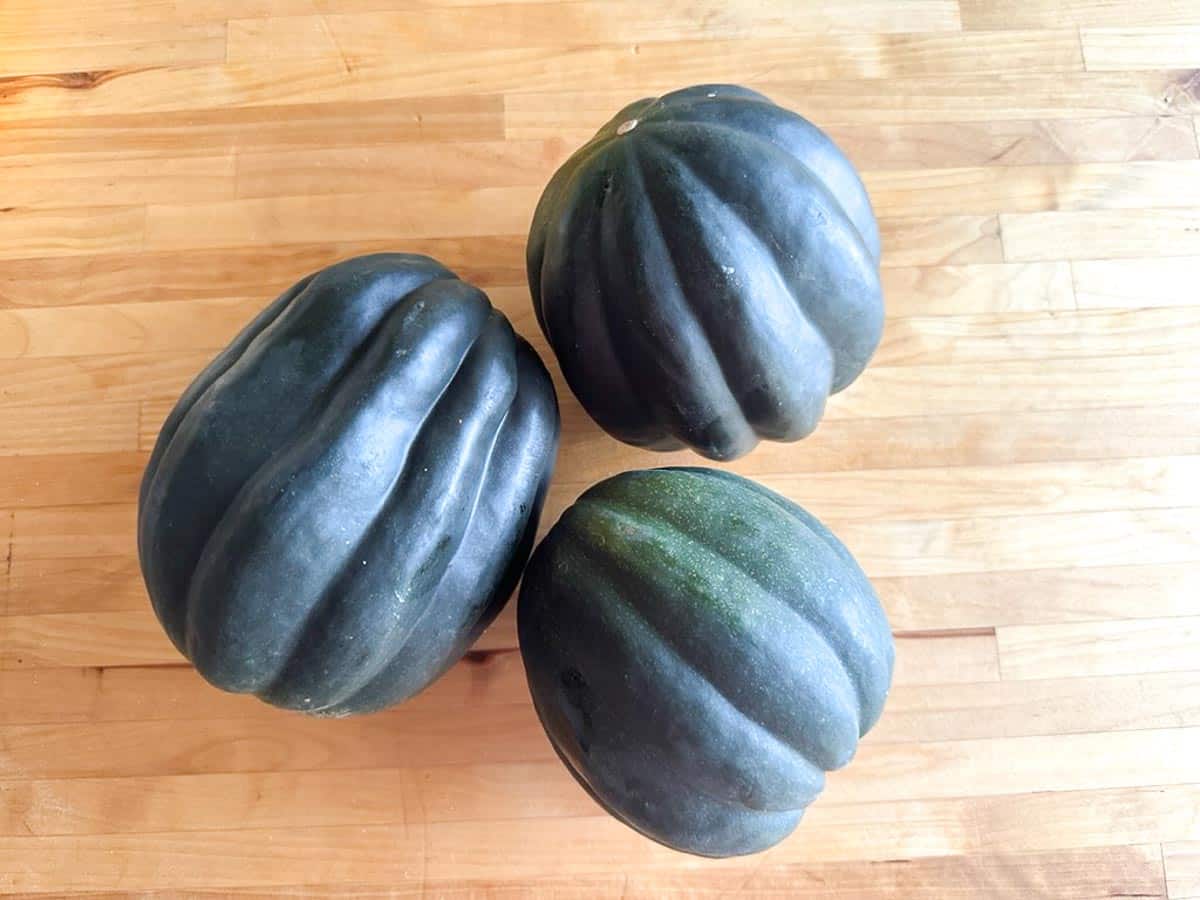
Monash University has lab tested acorn squash and a low FODMAP serving size of unpeeled is 59 g. We call for a total of 525 g of unpeeled acorn squash in the recipe, but the recipe serves 10, so each serving is therefore low FODMAP.
All Soy Sauce Is Not Created Equal
We have an article for you to read, Are Soy Sauce & Tamari Low FODMAP? and we suggest you check it out as a primer.
There are low FODMAP serving sizes of both, but what you need to pay attention to for this dish is to make sure and use high quality brewed low-sodium soy sauce. Some soy sauce is chemically produced and has a very salty and harsh taste, and it will ruin this dish. I am not exaggerating. The article explains all of this in-depth. Similarly, you need a low-sodium version.
We stand by our recipes as presented, and sometimes a particular ingredient is really important. This is one of those times.
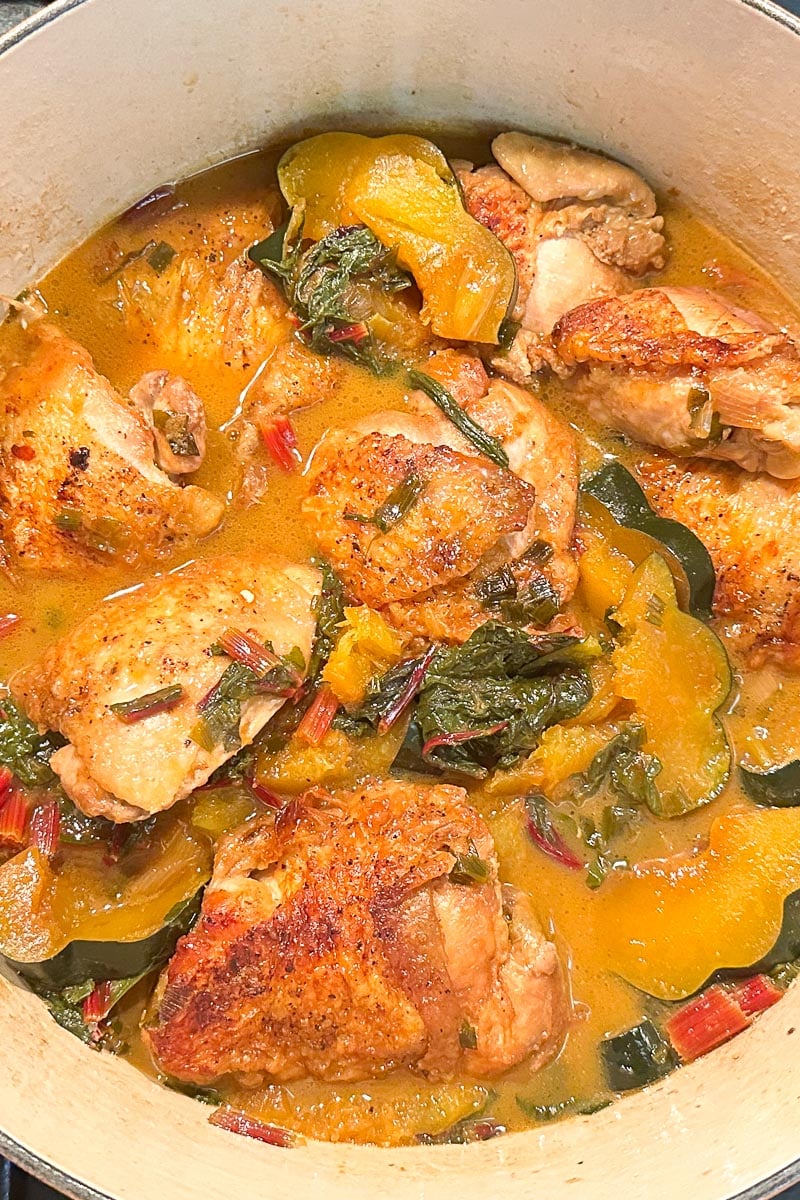
Watch the Salt
You will be seasoning the chicken lightly with kosher salt (sea salt will be too salty). The soy sauce lends salinity. Make sure you use a low-sodium chicken stock as well. If you do not, the dish will tip over into over-salted territory. (You can use homemade, or Gourmend works well here).
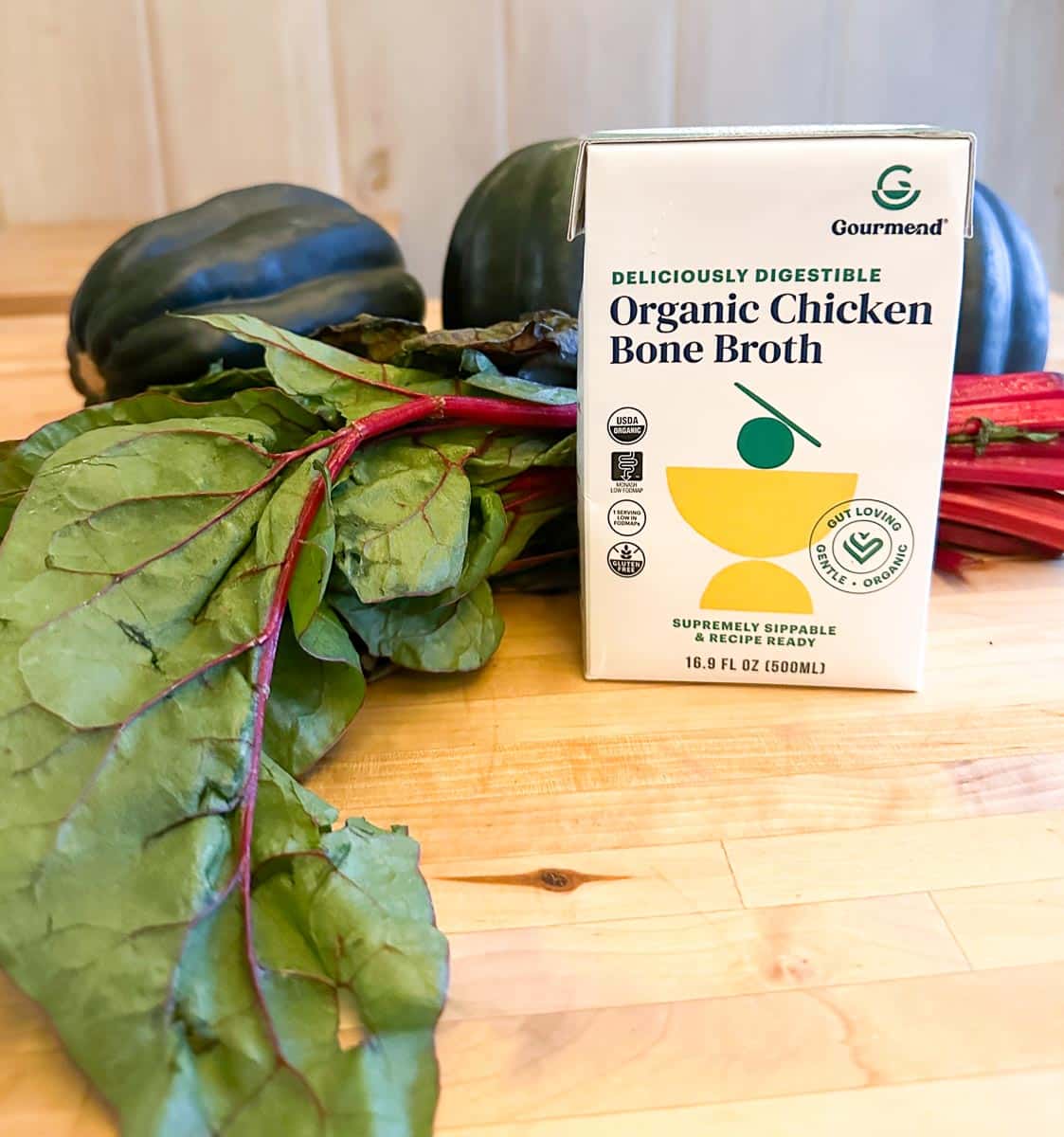
If you follow my suggestions, you will have a well-seasoned dish. The sweetness of the squash and brown sugar, the acidity of the vinegar, and the herbaceous quality of the greens balance out everything perfectly.
How to Make One-Pot Low FODMAP Braised Chicken with Swiss Chard and Acorn Squash
Very lightly season chicken thighs with salt and pepper. Heat vegetable oil in a large Dutch oven over medium-high (We used a 7.25-quart Le Creuset). Working in 2 batches and pouring off all but 2 tablespoons of fat between batches, cook chicken, skin side down, until skin is browned and crisp, about 8 to 10 minutes total. Transfer to a plate, placing skin side up.

Turn heat off momentarily, as there will be a lot of retained heat. Add scallions and ginger and sauté for a few minutes until ginger begins to take on some color. Turn burner on again to low as needed during this process. Stir in the Sriracha.
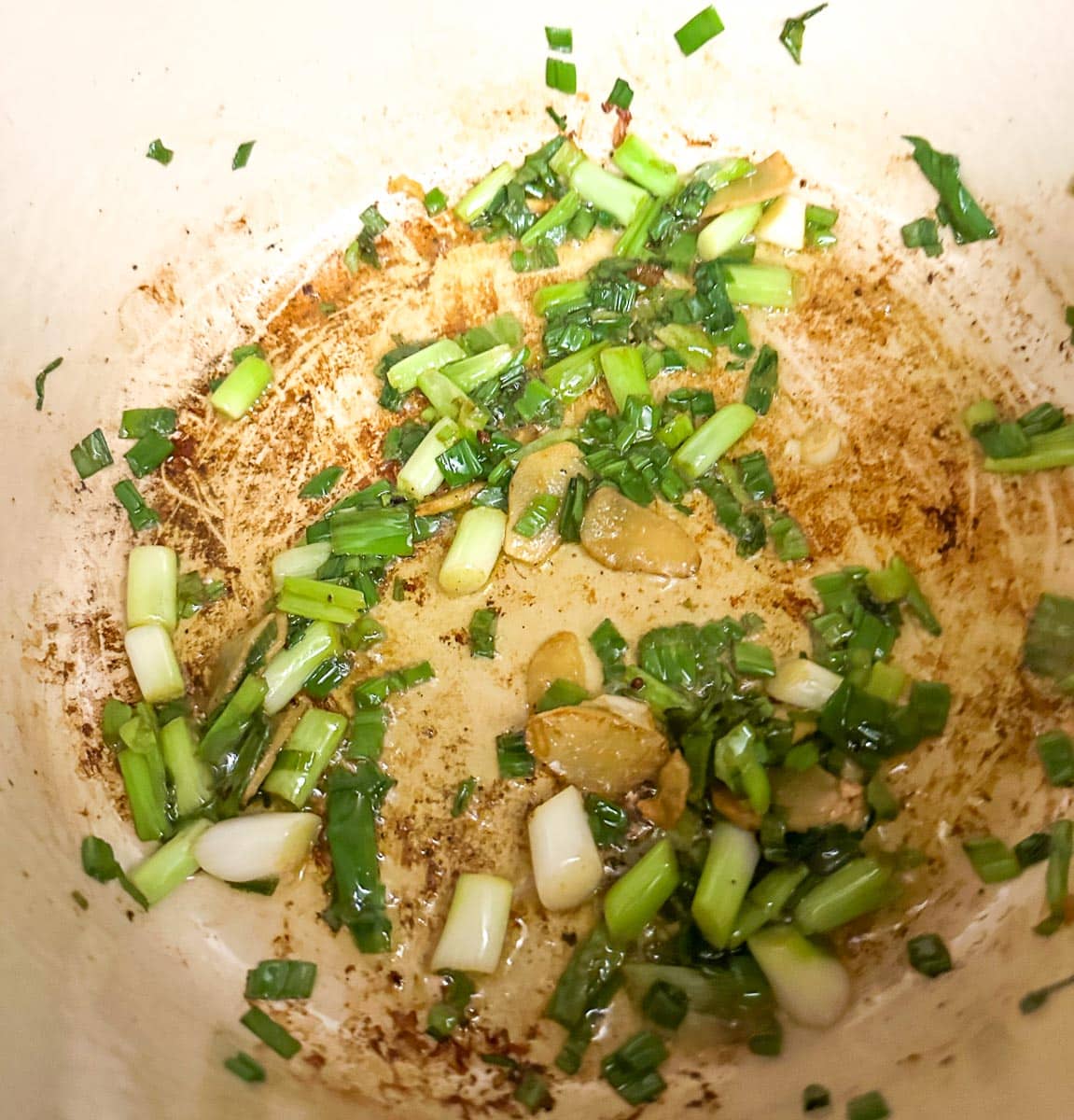
Add wine, adjust heat, bring to a simmer, and cook until reduced to about ¼ cup (60 ml). Stir in the soy sauce, brown sugar, sesame oil, and 1 cup (240 ml) stock and bring to a simmer.
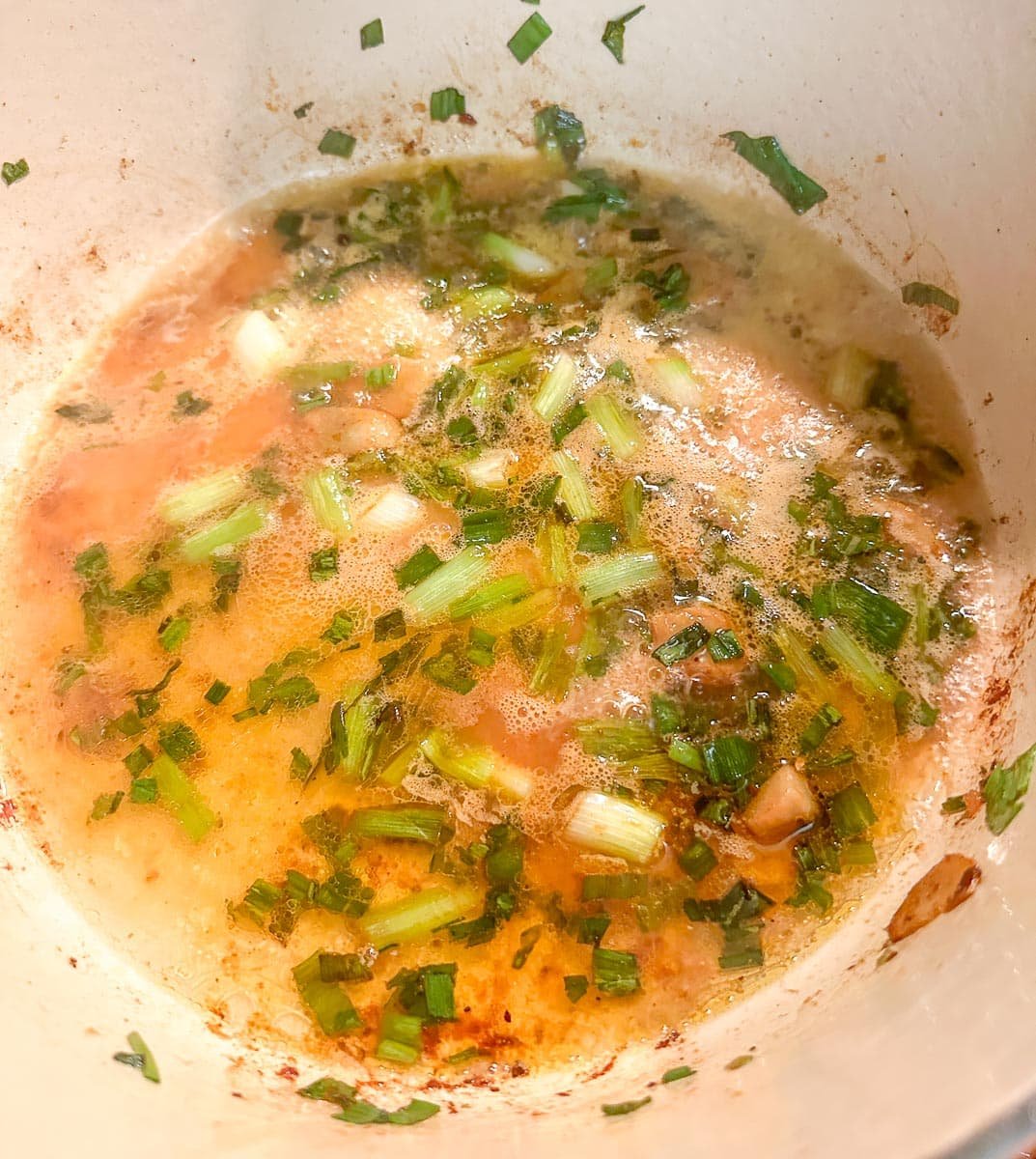
Return chicken to pot, placing skin side up, nestling as necessary.
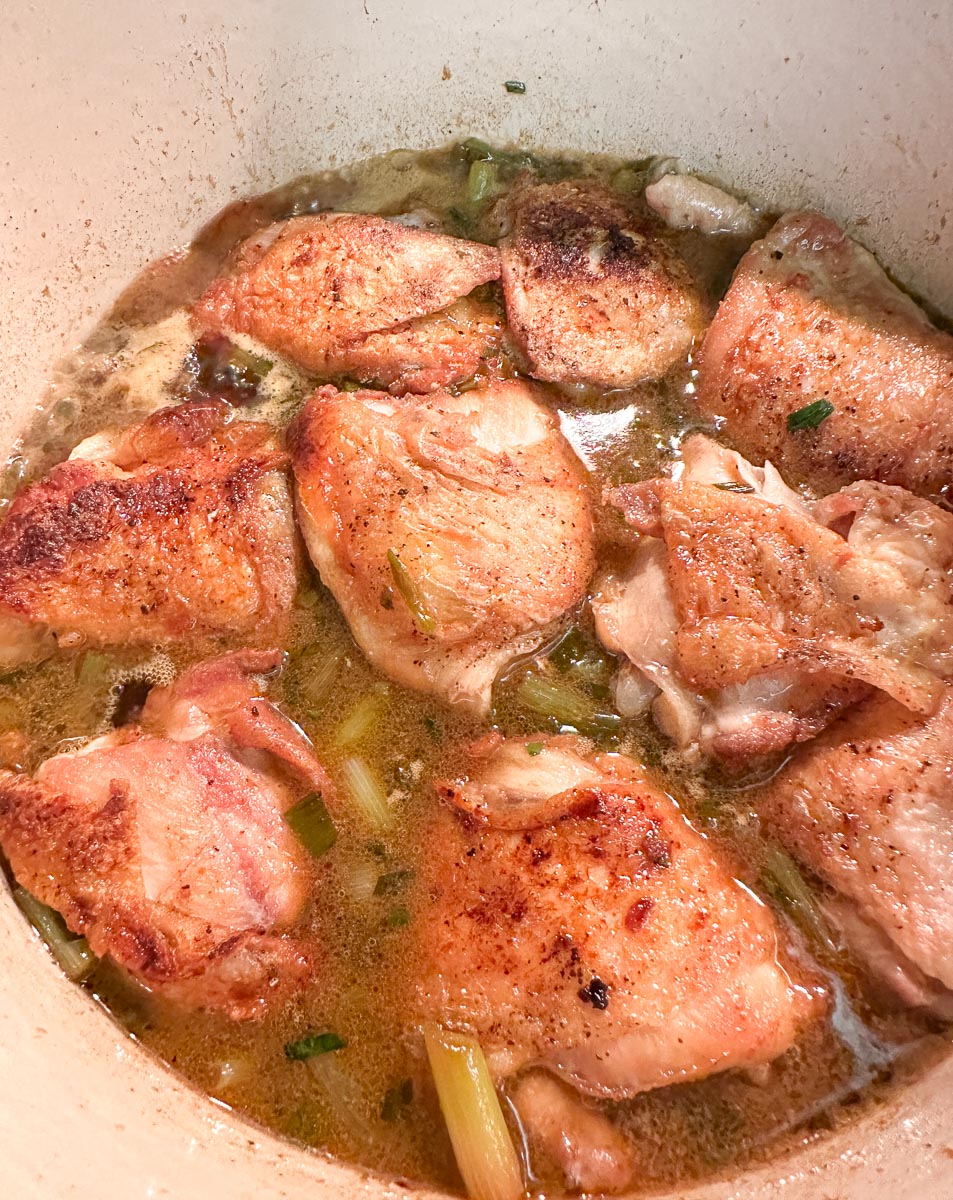
Partially cover pot, reduce heat, and simmer until chicken is cooked through, about 20 to 30 minutes.
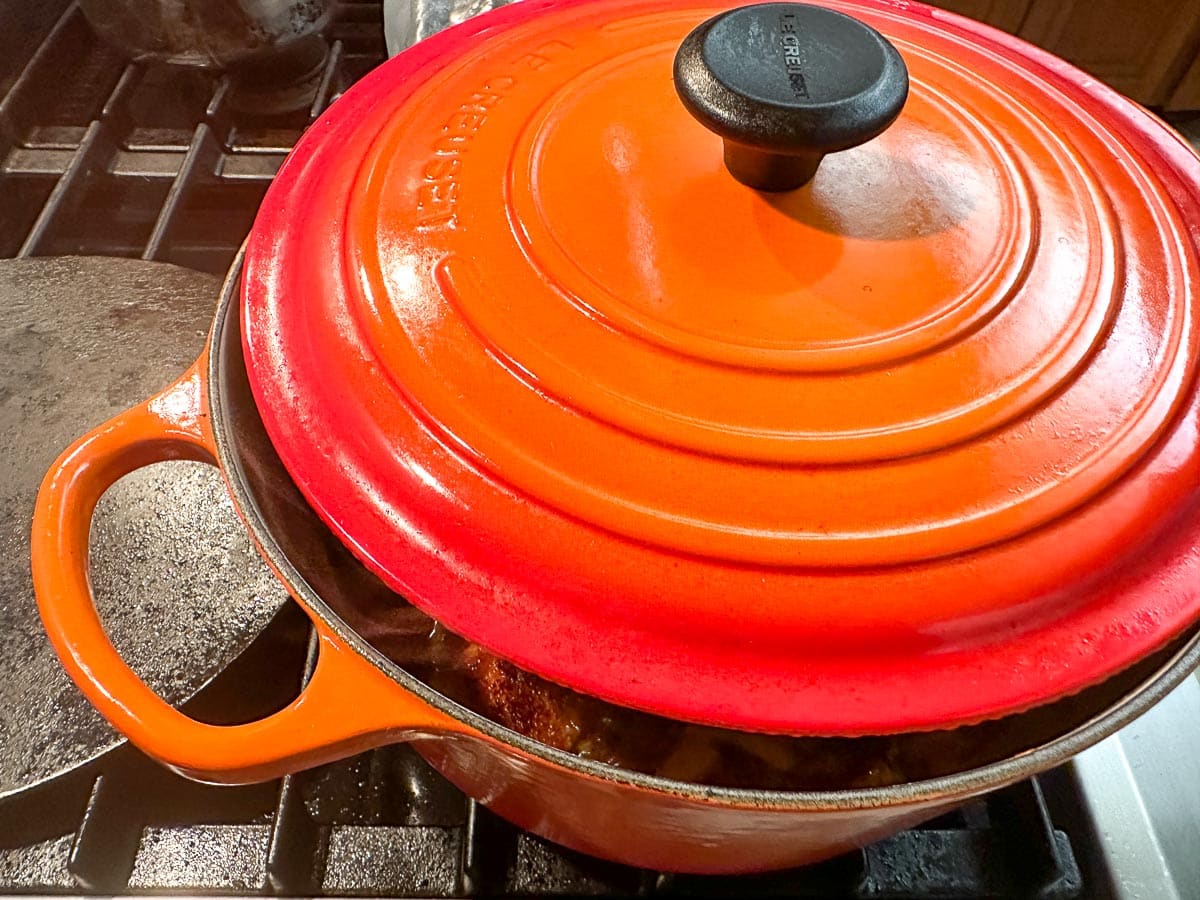
Transfer chicken to a plate.
Add squash and remaining 1 cup (240 ml) stock to pot. Top with Swiss chard.
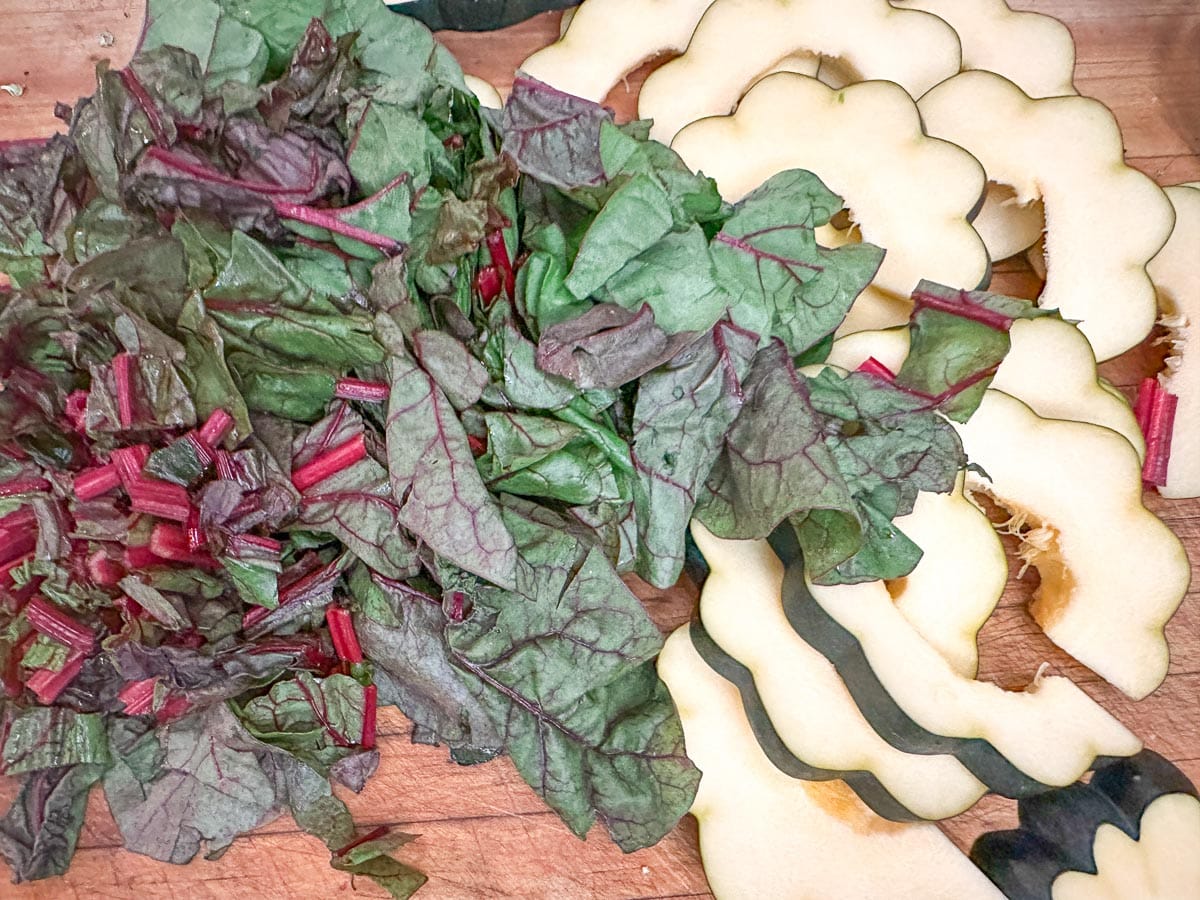
Cover and bring to a simmer, cooking until squash is barely fork-tender and greens are wilted, about 10 minutes. Uncover, increase heat to medium, and continue to cook until liquid is reduced by about two-thirds and has thickened, about 5 minutes more. Turn off heat. Drizzle the vinegar over all. Add chicken back to pot, turning to coat in sauce.
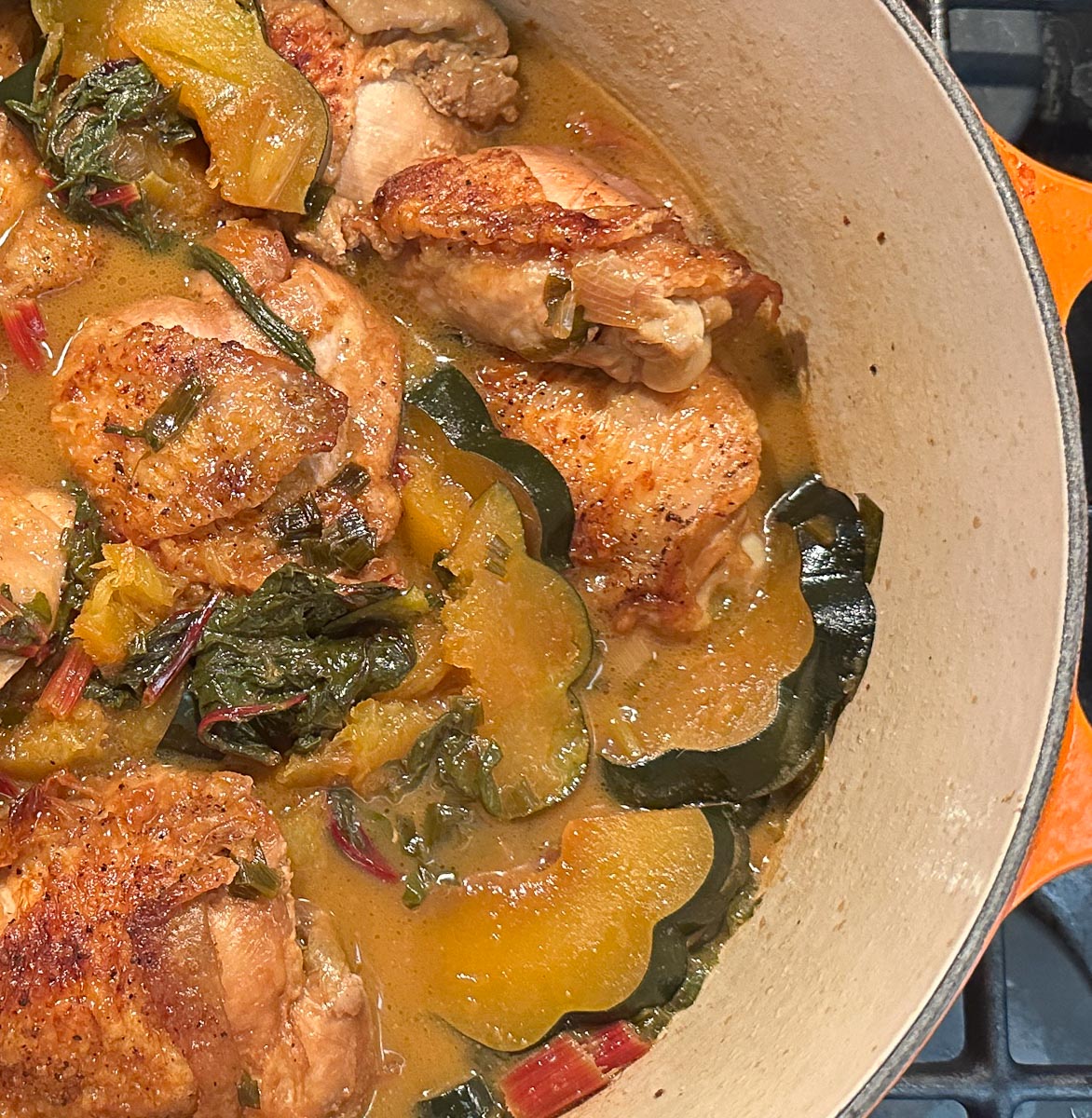
Your braise is ready to serve. We love it with rice. You can cool and refrigerate in an airtight container for up to 3 days. Reheat in same pot.
FODMAP Information
All recipes are based upon Monash University & FODMAP Friendly science at time of initial publication.
- Brown Sugar: Brown sugar has been lab tested by both Monash University and FODMAP Friendly. There are many kinds of brown sugar, from cane to beet (to blends) to Muscovado and more, which we discuss in our Explore An Ingredient: Sugar. Unfortunately, there is no information about what kind of brown sugars were lab tested. Monash gives us a low FODMAP amount of ¼ cup or 40 g but no further information. In addition, in private correspondence with Monash University we know that there are amounts larger than 40 g that would be considered low FODMAP. FODMAP Friendly gives us a low FODMAP amount of 13 g. Dark brown Muscovado sugar does appear in a product lab tested and certified low FODMAP by FODMAP Friendly, so we do know there is a low FODMAP amount.
- Ginger: Monash University has lab tested fresh ginger root and has determined it to be free of FODMAPs, making it one of our go-to no FODMAP foods.
- Oil: All pure oils are fats and contain no carbohydrates, therefore they contain no FODMAPs.
- Scallions: Monash University lab testing found no FODMAPs detected in scallion greens; they suggest a 75 g serving size. FODMAP Friendly has also lab tested scallions: their recommended serving size for the green parts is 16 g, with a max low FODMAP serving of 161 g. They have also tested the bulb and it is low FODMAP in 19 g portions, which is about 2 tablespoons finely chopped.
- Vinegar: Several vinegars have been lab tested by both Monash and FODMAP Friendly. From Monash: Apple cider vinegar is low FODMAP at 2 Australian tablespoons or 42 g; Balsamic vinegar is low FODMAP at 1 Australian tablespoons or 21 g; Malt vinegar contains no FODMAPs; Rice wine vinegar is low FODMAP at 2 Australian tablespoons or 42 g. From FODMAP Friendly: Balsamic gets a “Pass” at 2.5 tablespoons or 42 ml. Apple cider vinegar gets a “Pass” at 1 tablespoon or 14 g (don’t ask me why one is in milliliters and the other in grams).
Please always refer to the Monash University & FODMAP Friendly smartphone apps for the most up-to-date lab tested information. Foods will be retested from time to time; in the case of raw ingredients, such as fruits and vegetables, results may vary. All lab tested results are valid and represent a snapshot in time. As always, your tolerance is what counts; please eat accordingly. The ultimate goal of the low FODMAP diet is to eat as broadly as possible, without triggering symptoms, for the healthiest microbiome.
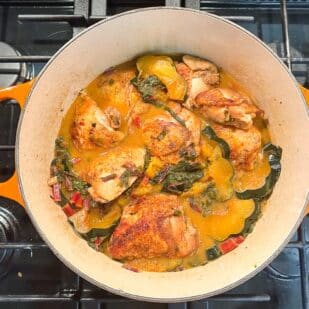
One-Pot Low FODMAP Braised Chicken with Swiss Chard and Acorn Squash
We love one-pot dishes, we love braised dishes, and we love winter squash! This One-Pot Low FODMAP Braised Chicken with Swiss Chard and Acorn Squash brings it all together, with Asian flavors of soy, toasted sesame oil, and ginger. Monash University lab tested acorn squash, and we now know what a low FODMAP serving size is, so we had to create something tasty for you. There will be more acorn squash recipes to come!
Ingredients:
- 4- pounds (1.8 kg) skin-on, bone-in chicken thighs (about 10), patted dry
- Kosher salt
- Freshly ground black pepper
- 2 tablespoons vegetable oil
- ¾ cup (48 g) finely chopped scallions, green parts only green and pale green parts only
- 2- inch (5 cm) piece ginger, peeled, thinly sliced
- 2 teaspoons Sriracha
- 1 cup (240 ml) dry white wine
- 1/2 cup (120 ml) gluten-free low-sodium soy sauce, such as San-J
- 3 tablespoons firmly packed light brown sugar
- 2 tablespoons toasted sesame oil
- 2 cups (480 ml) low-sodium low FODMAP chicken stock, divided
- 525 g (18.5-ounces) acorn squash; (remove stem, halve lengthwise, remove seeds, slice 1/2-inch (12 mm) thick to total 525 g)
- 1- pound (455 g) Swiss chard, larger woody stem ends removed, leaves chopped crosswise into broad ribbons; tender stems chopped into 1-inch (2.5 cm) lengths
- 2 tablespoons unseasoned rice vinegar
Preparation:
-
Very lightly season chicken thighs with salt and pepper. Heat vegetable oil in a large Dutch oven over medium-high (We used a 7.25-quart Le Creuset). Working in 2 batches and pouring off all but 2 tablespoons of fat between batches, cook chicken, skin side down, until skin is browned and crisp, about 8 to 10 minutes total. Transfer to a plate, placing skin side up.
-
Turn heat off momentarily, as there will be a lot of retained heat. Add scallions and ginger and sauté for a few minutes until ginger begins to take on some color. Turn burner on again to low as needed during this process. Stir in the Sriracha.
-
Add wine, adjust heat, bring to a simmer, and cook until reduced to about ¼ cup (60 ml). Stir in the soy sauce, brown sugar, sesame oil, and 1 cup (240 ml) stock and bring to a simmer. Return chicken to pot, placing skin side up, nestling as necessary. Partially cover pot, reduce heat, and simmer until chicken is cooked through, about 20 to 30 minutes. Transfer chicken to a plate.
-
Add squash and remaining 1 cup (240 ml) stock to pot. Top with Swiss chard. Cover and bring to a simmer, cooking until squash is barely fork-tender and greens are wilted, about 10 minutes. Uncover, increase heat to medium, and continue to cook until liquid is reduced by about two-thirds and has thickened, about 5 minutes more. Turn off heat. Drizzle the vinegar over all. Add chicken back to pot, turning to coat in sauce. Your braise is ready to serve. We love it with rice. You can cool and refrigerate in an airtight container for up to 3 days. Reheat in same pot.
Notes:
FODMAP Information
All recipes are based upon Monash University & FODMAP Friendly science at time of initial publication.
• Brown Sugar: Brown sugar has been lab tested by both Monash University and FODMAP Friendly. There are many kinds of brown sugar, from cane to beet (to blends) to Muscovado and more, which we discuss in our Explore An Ingredient: Sugar. Unfortunately, there is no information about what kind of brown sugars were lab tested. Monash gives us a low FODMAP amount of ¼ cup or 40 g but no further information. In addition, in private correspondence with Monash University we know that there are amounts larger than 40 g that would be considered low FODMAP. FODMAP Friendly gives us a low FODMAP amount of 13 g. Dark brown Muscovado sugar does appear in a product lab tested and certified low FODMAP by FODMAP Friendly, so we do know there is a low FODMAP amount.
• Ginger: Monash University has lab tested fresh ginger root and has determined it to be free of FODMAPs, making it one of our go-to no FODMAP foods.
• Oil: All pure oils are fats and contain no carbohydrates, therefore they contain no FODMAPs.
• Scallions: Monash University lab testing found no FODMAPs detected in scallion greens; they suggest a 75 g serving size. FODMAP Friendly has also lab tested scallions: their recommended serving size for the green parts is 16 g, with a max low FODMAP serving of 161 g. They have also tested the bulb and it is low FODMAP in 19 g portions, which is about 2 tablespoons finely chopped.
• Vinegar: Several vinegars have been lab tested by both Monash and FODMAP Friendly. From Monash: Apple cider vinegar is low FODMAP at 2 Australian tablespoons or 42 g; Balsamic vinegar is low FODMAP at 1 Australian tablespoons or 21 g; Malt vinegar contains no FODMAPs; Rice wine vinegar is low FODMAP at 2 Australian tablespoons or 42 g. From FODMAP Friendly: Balsamic gets a “Pass” at 2.5 tablespoons or 42 ml. Apple cider vinegar gets a “Pass” at 1 tablespoon or 14 g (don’t ask me why one is in milliliters and the other in grams).
Please always refer to the Monash University & FODMAP Friendly smartphone apps for the most up-to-date lab tested information. Foods will be retested from time to time; in the case of raw ingredients, such as fruits and vegetables, results may vary. All lab tested results are valid and represent a snapshot in time. As always, your tolerance is what counts; please eat accordingly. The ultimate goal of the low FODMAP diet is to eat as broadly as possible, without triggering symptoms, for the healthiest microbiome.
Nutrition
All nutritional information is based on third-party calculations and should be considered estimates. Actual nutritional content will vary with brands used, measuring methods, portion sizes and more. For a more detailed explanation, please read our article Understanding The Nutrition Panel Within Our Recipes.
